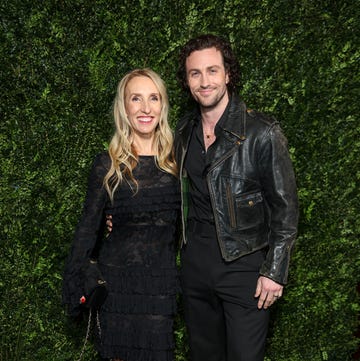Google 'how to write a novel' and there are 237 million results to choose from: factual 'how to' manuals; rose-tinted listicles from authors who did it; self-styled experts with formulas for writing a bestseller in 100 days... I read them all. But the best advice was five words from Tom Clancy - how do you write a book? 'Just tell the damn story.'
Yet what I didn't find among those results was an honest account of the gruelling reality of getting a book published - the obsessiveness it breeds, the days you want to throw your laptop at a wall, the nights you write until 4am then struggle to function at work the next day, the months spent researching 1960s lunatic asylums – and the moment your agent tells you to delete the entire storyline about lunatic asylums. So here is the article I wish had existed – the reality of writing a novel and seeing it through to print.
1. Find an idea (or two)
It is 2007. I am an English student at Warwick University, desperate to write a novel – but have no ideas and, well, nothing to say. So I write to 30 novelists, cheekily asking where they get their ideas. I pretend to be a PhD student researching my thesis – who would listen to a lowly undergraduate? Surprisingly a dozen reply. A.S. Byatt's response sticks with me. 'The work starts when two things suddenly strike against each other in my mind like matches and a matchbox.' I try fusing opposing storyline ideas - and it works; the friction between two makes for a far more powerful, layered plot.
2. Write a novel – and don't get it published
I graduate, start working as a junior features writer at a newspaper with little free time – but I have an idea for a novel I'm burning to write. Each night I hurry home and work on it until 3am. I do this for eight months. I become sallow, spotty, obsessed, exhausted. I have a severe episode of depression that leaves me bedridden for a month. Afterwards I hurriedly finish the book and send the opening to 10 literary agents. They all request the whole manuscript – but say it's too bleak; a good novel needs both light and shade. I decide it isn't a waste; it taught me how I write and what NOT to do. Don't write at the expense of your career and health. And don't make it too damned miserable.
3. Live a little, then write (but not about that)
I leave my job to freelance, spend a month in India, sign up for a writing course – and am ready to try again. Yet I struggle to find an idea. Everything feels contrived. One Sunday afternoon when my boyfriend is in football practice, I idly log into Facebook and stumble upon a familiar face. He is smiling and posing with his new girlfriend. A familiar stabbing sensation rips through me. Years have passed since I last saw him. He probably barely remembers me. But he left a lasting mark and sometimes I find myself thinking 'what if'. Without planning, I begin writing about a failed relationship of two opposites; the girl whose life was affected by the affair, the possibility the man never cared for her, the thrilling 'what if' that he did. The authenticity of the storyline, the fact it means something so deeply to me, makes me write faster than I ever have. And following A.S. Byatt's advice, I weave in another, more sinister storyline about a murderer on the loose in 1950s Cornwall. By the time my boyfriend gets home, I have 8,000 words.
4. Plan, but only a bit
I stop at 12,000 words and begin planning. First, I write a sentence summarising the book – what do I want to say? Next I write a paragraph summary of the plot. Then I write a side of A4 about each of character. I try to write 20 plot points to follow but feel straitjacketed so I put them in the bin. Instead, I write a checklist. Do you have a ticking clock? Yes. Do you have a journey (ie, will your characters change from start to end)? Yes. Do I know where I'm going? Yes. So off I go.
5. Dash out your first draft fast
I stop pitching journalism ideas and making social plans. I use my meagre savings to pay my rent. For the next six months I allow myself to simply write. I do this from 8am until 7pm. Sometimes I go swimming to unscramble a plot problem in my head. I go to Waitrose with my friend and rattle through the plot, from start to finish, by the time we reach the checkout, then let her grill me on inconsistencies. Other than that my only outings are to my Faber Academy writing course. I get a bit agoraphobic and the world I'm writing becomes more real than the outside world but I don't mind. By the time my course is over, I have a first draft of 120,000 words.
5. Lock the drawer, don't open the drawer
I do a rough overall edit then stick the manuscript in a drawer, wash my hair (something I've neglected to do often enough for six months) and force myself to go back to work. This is the hardest part. I desperately want to edit more but every writer – even Zadie Smith – swears by the bottom drawer method, so that you can return to it for editing with a fresh eye. Six months is optimal. I manage three. I spend my leisure time, in those three months, editing a friend's novel, which proves helpful. Identifying his clunky plot threads and the discrepancies in his characters makes it easier to see those issues in my own writing when the time comes.
6. Rewrite. Edit. Edit. Edit. Repeat
'The key to good editing is to do draft after draft because you won't be able to see in one sitting all that needs to be done.' Novelist Richard Skinner's advice on this subject is the best I've heard. This is also the biggest stage - it takes me 18 months. I edit to check the bigger picture works. I edit it again to ensure the characters feel consistent. I send it to four first readers, then edit it with their feedback in front of me. I buy a mini laptop and edit it on my commute to work. I print it out and edit it on a park bench at lunchtimes. I go on a writing retreat in Andalucia for a final leisurely read – then realise the identity of the murderer is wrong and it needs an entire rewrite. And, as a result, a restructure. I do this. Edit some more. Send it to three more first readers. Share a chapter at an open-mic literary night (and am almost sick with nerves). Do a line edit (where I check every word and phrase works). Another final line edit. Then it's ready. By now I've cut it from 120,000 words to 80,000.
7. Write a cracking email to literary agents
I research literary agents online; what sorts of writers do they represent? What sorts of novels are they looking for? Which agents represent my favourite novelists? I draw up a list of my 30 dream literary agents in order of preference. Then I craft my emails. I email four a fortnight, I stop at 12. I keep my emails short, professional, punchy and humble. Each contains: a) my career credentials and formal writing experience (ie, my journalism background and Faber Academy course), b) the reason I approach that agent particularly (ie, I think my novel could tap into a similar readership as one of the novelists they represent), c) a one-sentence elevator pitch of my novel (ie, The Unforgotten is a dark literary thriller set in the 1950s about a schoolgirl who falls in love with a much older man – with devastating consequences that unravel over the decades). I also attach a full synopsis and the opening three chapters (or whatever the agent requests on their website.) Then I sit on my hands and wait.
8. Choose your agent well
I get lucky. Ten of the 12 agents request to see the whole novel. And three want to meet me. I put on my most authorly blazer and hop on the bus. Two offer full representation; they read it until the early hours in one sitting, they say how much they love it. I ask how they want to market it - they say, with some tweaks, it could be a crime fiction novel and could sell well. The third, from the biggest agency, is cooler. She thinks there is something in it, but it needs a lot of work. Until I've done that work, she doesn't know whether it will be suitable to send to publishers. She doesn't see it as a crime novel but a moral dilemma with a bittersweet relationship at its heart. I decide to work with her. I love her honesty, her vision for the book, I'm prepared to work hard. It takes two rewrites, an edit and another nine months before she is ready to send it out. Then, months later, when I've all but given up hope, I get the call that makes it all worth it. 'We've found you a publisher.'
After that? The real hard work begins…
Laura Powell is a Commissioning Editor at the Daily Telegraph. Her debut novel, The Unforgotten, is out now, £8.99. Buy it here: http://amzn.to/21hZ5I1www.laurajaynepowell.com
(Images: Getty)












